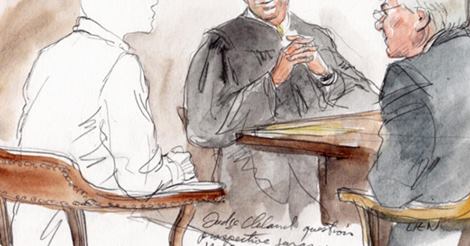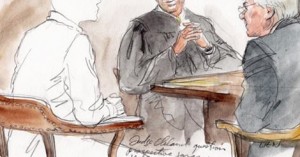






Understanding What To Expect – The Stages of A Colorado Criminal Case -Before Trial
Introduction – This web page gives a detailed account of every stage of a Colorado Criminal case. Much of the information is taken from an excellent source of Colorado criminal laws and procedures by the Boulder Bar Association’s Web Site for Media Professionals. The balance was added by H. Michael Steinberg – Colorado Criminal Defense Attorney.
The Stages of a Colorado Criminal Case
The Stop (Misdemeanors and Felonies)
The Stop is a temporary detention of an individual for investigation. To be legal, a stop must be based on reasonable suspicion to believe the individual has committed, or is about to commit, some violation of the law. If the stop yields information to confirm the suspicion, the stop may escalate into an arrest.
The Arrest (Misdemeanors and Felonies)
The Arrest is the taking a suspect into custody for the purpose of prosecution on a criminal charge. To be legal, an arrest must be based on probable cause—a belief that it is more likely than not that the suspect has committed an offense. An arrest occurs when a person is apprehended or detained to answer for an alleged crime.
Courts have described an arrest as occurring when a reasonable person in the shoes of the person would feel that his freedom of movement is restricted in a significant way by law enforcement action. Courts use an objective, reasonable person test to determine if a person is placed under arrest. The subjective intent of the officer is a factor, but is not dispositive of the question whether an arrest has occurred. A person need not be handcuffed, or taken to the jail, or even specifically told they are under arrest for an arrest to occur.
Understanding Colorado ARREST WARRANTS
An officer can arrest a person without a warrant when: (1) the person has committed or is committing a crime in the officer’s presence or (2) the officer has probable cause to believe that the person has committed a crime. Probable cause is the reasonable belief that an offense has been or is being committed by the person arrested. But before arresting a person in a home, an officer must get an arrest warrant, unless the officer receives consent to enter the home or there are emergency (exigent) circumstances.
An officer can also arrest any person for whom there is an arrest warrant. An arrest warrant is a written order issued by a judge, commanding the authorities to arrest the named person and bring him or her without unnecessary delay before the nearest available judge of a county or district court. A judge can issue an arrest warrant only upon a sworn affidavit that explains facts sufficient to establish probable cause that an offense has been committed and that a particular person committed the offense.
Booking (Misdemeanors and Felonies)
Booking is the process of officially recording an arrest. It typically includes (1) photographing the defendant (i.e., taking a “mug shot”), (2) fingerprinting the defendant, and (3) obtaining pedigree information (name, address, date of birth, etc.) from the defendant.
Bail and Bonding “Out”
With certain very limited exceptions noted below, everyone is entitled to bail. Bail means the amount of money or other security that must be posted with the court for the release of a person in custody. Bail is set by a judge. The purpose of bail is to ensure that the person appears in court and complies with other conditions set by the court as a condition of release. The court fixes the amount of bail based on information provided by bond commissioners concerning the offense and the background of the defendant. Bond commissioners are employees of the judicial district whose work includes preparing these reports.
The court setting bail may require that it be posted by either a secured bond or allow it to be posted by an unsecured bond. A secured bond may be posted by depositing cash with the court, or by depositing certain approved securities or real estate with the court, or through the use of aprofessional bonding agent – commonly called a bail bondsman – who has been approved by the State to post bonds on behalf of persons accused of crimes.
An unsecured bond is merely a promise by the defendant to appear in court – a personal recognizance bond – or a promise by both the defendant and some other party that the defendant will appear in court – a co-signed personal recognizance bond. . An unsecured bond does not require the posting of any money or other property. If the accused does not appear in court as ordered, or violates other condition of the bail, the bond maybe forfeited.
After arrest, a person is taken into custody and kept there until bond is posted. Bond conditions might already be set if the arrest was effected by an arrest warrant. If the accused was arrested without a warrant, bond will typically be set at the first appearance or the advisement. The arresting officer can also exercise her discretion and release the person by issuing a summons requiring the person to appear in court on a future date.
The purpose of bail is to ensure the defendant’s future appearances in court and not to punish a defendant before he has been convicted. This purpose should be met by means that impose the least possible hardship upon the accused.
When a judge issues an arrest warrant, the judge will usually set bail as part of the issuance of the warrant. When a person is arrested without a warrant, bail may be set pursuant to a bail schedule established by the judges of the district. An arrested person whose bail has been set pursuant to warrant or the local bail schedule may post bail before seeing a judge. In any event, the judge who conducts the first appearance of the person in court can review and modify the amount of bail and the type of bond required to post that bail.
The Filing of Charges
In Colorado, prosecutions for state criminal offenses are brought by indictment, information, complaint or summons and complaint. The prosecutor has broad discretion in deciding how to initiate a prosecution. An indictment is returned by a grand jury, an information is filed by a prosecutor, a complaint and a summons and complaint may be filed by either a prosecutor or a law enforcement officer.
Charging Colorado FELONIES
Prosecution for a felony may be started one of three ways: 1) the return of a grand jury indictment; 2) the filing of an information in district court by the district attorney or 3) the filing of a felony complaint in county court by the district attorney.
The vast majority of felony prosecutions are started by the district attorney filing a felony complaint in county court, after a review of reports submitted by law enforcement officials. A district attorney might file a felony information in district court when the case is particularly important, such as a first-degree murder case. This way a district court judge will conduct the preliminary hearing. Grand jury indictments are discussed below.
Charging Colorado MISDEMEANOR AND PETTY OFFENSES
Prosecution of a misdemeanor or petty offense is initiated in county court by complaint or by summons and complaint under simplified procedures set out in the Colorado Criminal Rules of Procedure. In Boulder, the overwhelming majority of misdemeanor complaints are filed by the arresting officer.
When a peace officer makes a misdemeanor or petty offense arrest, either with or without a warrant, the arrested person should be taken without unnecessary delay before the nearest county court. A complaint, or summons and complaint, should immediately be filed in the proper court, and a copy given to the defendant before or at arraignment. Most misdemeanor defendants are advised of their rights and arraigned on the charges at this first appearance.
The Advisement Hearing (Misdemeanors and Felonies)
Sometimes mistakenly referred to as an arraignment the advisement is the initial appearance of the defendant in court to answer the charges in an accusatory instrument. At the arraignment, the judge (1) provides the defendant with a copy of the accusatory instrument, (2) advises the defendant of the right to counsel and arranges for counsel to be provided without cost if the defendant is indigent, and (3) considers the matter of bail.
The law requires that a person who is arrested be taken without unnecessary delay to appear before the nearest available county or district court judge. Responsibility for conducting advisements rotates among the county court judges.
If the person was arrested without a warrant, the court reviews police reports and other information to determine whether there was probable cause to support the arrest. If the court does not find probable cause, the court should release the person on a personal recognizance bond. In all other situations, the court will determine what amount of bail and type of bond are appropriate.
If the person has been arrested for a felony, it is often the case that the prosecution is still determining what, if any, charges should be filed. Therefore, a person arrested for a felony is advised that he or she is under investigation and a court date is set, usually within three days, for the filing of charges. When felony charges are filed, the defendant may ask for a preliminary hearing or a status conference, as further described below.
If the person has been arrested for a misdemeanor or petty offense, charges have almost always already been filed by the arresting officer. In misdemeanor cases, many judges proceed immediately to arraignment, that is, the taking of a plea. A defendant who wishes to plead guilty may do so at this time. A defendant who wishes to engage in plea negotiations or to contest his case, may enter a plea of not guilty and ask that the case be set for a pre-trial conference as further described below.
The Preliminary Hearings and Mandatory Dispositional Hearings (Felony Hearing Only)
Generally speaking, a defendant who is arrested on a felony charge and held in jail has the right to an impartial testing of the evidence within a certain, relatively short time frame after advisement (30 days in Colorado).
In felony cases, Colorado’s rules of procedure and statutes require that either a preliminary hearing or a dispositional hearing be held prior to the formal arraignment of the defendant. These are usually held in county court. A preliminary hearing is a full-scale, adversarial hearing with witnesses before a judge to determine whether there is probable cause to believe the defendant committed the crime charged. The prosecution must only show probable cause, not enough evidence to support a conviction.
The preliminary hearing is a screening device that gives the defendant an opportunity to challenge the prosecution’s evidence and weeds out those cases that should not proceed to trial. A preliminary hearing also gives the attorneys the opportunity to engage in plea negotiations. A defendant charged by grand jury indictment is not entitled to a preliminary hearing. Preliminary hearings are available in all Class 1, 2 and 3 felonies, in certain more serious Class 4, 5 and 6 felonies, and in all other Class 4, 5 and 6 felonies if the person remains in custody.
A dispositional hearing is scheduled in those less serious Class 4, 5 and 6 felonies when the defendant is not in custody. A dispositional hearing is not an adversarial hearing and does not involve the presentation of evidence or witnesses. It is an opportunity for the attorneys to discuss the case and determine whether it can be resolved through plea negotiation or should proceed to trial.
Persons charged with misdemeanors are directed to attend a pre-trial conference. A pre-trial conference is like a dispositional hearing in that it is an opportunity for the lawyers to negotiate rather than an adversarial hearing in front of a judge.
What can be inferred from a defendant’s waiver of the preliminary hearing?
Most defendants waive their preliminary hearings. This pattern is probably a reflection of tactics, though, and should not necessarily be interpreted as evidence of the defendant’s perception of the strength of the State’s evidence. Speaking tactically, a defendant has little to gain from a preliminary hearing. Because the hurdle is so low, it is unlikely that the defendant will defeat the charge at the preliminary hearing. Further, the defendant is allowed very little latitude in questioning witnesses, so the hearing cannot be used like a deposition in a civil proceeding simply to discover more about the evidence.
In addition, a defendant who demands a preliminary hearing may aid the State by preserving a record of the testimony of a witness who might not appear later at trial or whose memory might not be as strong at trial. Finally, a defendant may believe that the best strategy for resolving his or her case favorably is to demonstrate conciliation from the get-go.
Colorado – GRAND JURIES Process and Procedures
The Colorado Grand Jury – A jury whose job is to determine if there is adequate evidence to charge a defendant with a crime. Not all States use the grand jury system. Colorado rarely uses the Grand Jury – but it is commonly used by at least one prosecutorial agency – the Colorado Attorney General.
The attorney general can ask an appropriate chief judge to convene a state grand jury that has jurisdiction beyond any single county or judicial district. The grand jury term is for twelve months but the court can discharge it early or enlarge the term to up to eighteen months if required for the efficient administration of justice.
The grand jury has the power to investigate crimes. It then has the discretion to determine whether there is probable cause that a particular person committed a crime and whether an indictment should be returned. Unlike law enforcement agencies, the grand jury has subpoena powers, enabling it to compel the appearance of witnesses or the production of documents, and it can use that power to investigate crimes by obtaining evidence otherwise not available to the law enforcement agency or the prosecution.
The indictment, which is sometimes referred to as a “true bill”, is a written statement signed by the foreperson of the grand jury and by the prosecutor and presented in court, charging a person with a crime. When charges are initiated by indictment, the defendant is not entitled to a preliminary hearing, but the defendant can request that the court review the grand jury record to determine whether the grand jury’s finding of probable cause is supported by the record. When the grand jury does not return an indictment, it may issue a report, but only under specified circumstances and after following specified procedures. The secrecy of the grand jury continues until an indictment or a report is made public. If no indictment or report is issued, the proceedings of the grand jury remain secret.
Only a small number of prosecutions in Colorado state courts are initiated through the use of a grand jury. A grand jury might be considered useful when the prosecutor believes that further investigation should be done and that the subpoena power, the ability to take sworn testimony, and secrecy rules of grand jury proceedings will assist in that investigation. Additionally, a prosecutor might turn to the grand jury in a politically sensitive case in order to take the evidence before a group of citizens to include their experience and objectivity, as well as the sentiment of the community they represent, as part of the charging decision
Making Discovery
A pre-trial stage where the parties exchange information about the evidence and arguments they will offer at trial. In Colorado, the burden of supplying discovery information rests almost entirely upon the prosecution. This is because the presumption of innocence and the privilege against self-incrimination generally permit a defendant to remain silent throughout the prosecution.
Plea Bargaining In Colorado – Plea Bargaining Explained
The overwhelming majority of criminal cases settle through plea negotiation, which is also referred to as plea bargaining. Settlement discussions are provided for by Colorado statutes, and are a practical necessity given the number of cases that are filed compared to the ability of the court system to handle trials. While plea bargaining is the target of occasional criticism, the practice has been an integral part of the criminal justice system for many years. More than 95 percent of all criminal cases in Colorado are resolved without trial.
Prosecutors often offer shorter sentences or reduced charges to defendants who plead guilty, on the premise that doing so will achieve a fair and just result, and will do so more quickly and efficiently than resolving the matter through trial. Another basis for settling a case through negotiation is the idea that a defendant who pleads out is taking responsibility for her actions related to the criminal charge.
Plea bargains in Colorado are sanctioned by statute and rule. Colorado recognizes plea bargaining as a valuable tool in expediting the administration of criminal justice. However, a defendant does not have a constitutional right to a plea bargain. Plea negotiations can occur at any stage of the proceedings. Sometimes cases can be resolved as quickly as the day charges are filed, sometimes they are not resolved until the morning of trial. Pre-trial conferences and dispositional hearings are two proceedings at which plea negotiation is explicitly encouraged but, as a practical matter, plea discussions may take place at virtually all hearings and at many points in between those hearings.
The topics that are usually considered by both sides in plea bargaining include: the absence or existence of a prior criminal record; whether the offense was a crime against property or a person; if the offense was a crime against a person, how the victim feels about the case; if the offense is a property crime, whether the property was recovered; the possibility of restitution; the willingness of the defendant to undergo counseling or treatment; the relative weaknesses and strengths of the available and admissible proof in the case; the likely outcome at trial; the likelihood of rehabilitation or recidivism; any collateral effects of the plea upon the defendant; whether the defendant will cooperate with authorities in other criminal investigations; the viability of any affirmative defenses that might be available; the defendant’s degree of involvement in the crime; and the probable sentence upon conviction.
The legislature has put some restrictions on a prosecutor’s ability to settle a case. For example, a charge of Driving Under the Influence cannot be reduced to a charge that is not alcohol related unless the prosecutor does not even have a prima facie case on the original charge, that is, unless the prosecutor’s case is so weak that even if one looks at the facts in the light most favorable to the prosecution, the prosecution simply will not be able to convince a jury of guilt. The same is generally true of domestic violence cases.
With these few exceptions, prosecutors have great discretion in offering to settle cases. Prosecutors can offer to reduce or dismiss charges to more accurately reflect the actual conduct of the defendant and to lessen the possible sentence faced by the defendant. A prosecutor might agree to recommend a particular sentence, or to not oppose a particular sentence, in exchange for the defendant agreeing to plead guilty to one or more charges. A prosecutor might agree to probation, with a wide range of conditions, if the prosecutor deems the defendant to be the sort of person who is amenable to supervision and who does not need to be incarcerated.
Prosecutors may also agree to a deferred prosecution, that is an agreement to stop prosecuting the case for some period of time during which the defendant agrees to stay out of trouble and meet other conditions such as the payment of restitution or counseling. If the defendant meets the conditions, the case is dismissed; if the defendant does not, the prosecution of the case resumes and the defendant either reaches a new agreement or proceeds to trial.
Another common method of settling criminal cases is through a deferred judgment and sentence. Under this procedure, the defendant pleads guilty to a charge, but the judge does not officially enter a judgment of conviction against the defendant. The defendant is ordered to stay out of trouble and meet other conditions, just as with a deferred prosecution. If the defendant succeeds, the guilty plea is withdrawn and the case is dismissed. If the defendant fails to meet the conditions, a judgment of conviction is entered on the previously tendered guilty plea, and the defendant is sentenced to whatever sentence the trial court deems appropriate.
Once the prosecutor, defense lawyer and defendant reach a plea agreement, that agreement must still be submitted to the judge for approval. A judge retains the authority to accept or reject any plea agreement that he or she does not believe is fair. Most judges defer to the lawyers’ judgments about the fairness of a settlement because, after all, the lawyers generally know far more about the case and the defendant and the other circumstances, than does the judge. Once a judge determines that a particular agreement is fair, the judge then has a duty to inquire of the defendant to make sure that the defendant fully understands the agreement, and all of the rights that he or she is giving up by entering into the agreement.
The Formal Arraignment
Technically, arraignment is the entry of a plea. The plea may be a plea of guilty, not guilty, not guilty by reason of insanity or no contest.
When a defendant pleads guilty, the court must make sure that the defendant is doing so voluntarily and intelligently, with a full understanding of the rights he or she is giving up and with a full understanding of any plea agreement that has been reached in the case. After accepting a guilty plea, the court either imposes a sentence immediately (the procedure in most misdemeanors and traffic cases) or sets the case for a sentencing hearing in the future (the procedure in most felony cases). If the case is continued for sentencing, a pre-sentence report may be prepared by the probation department.
A plea of no contest, also known as a plea of nolo contendre, is a statement that the defendant is not contesting the issue of guilt or innocence but is acknowledging that there is sufficient evidence to establish guilt. In Colorado, a defendant may only plead no contest with consent of the court. There is no difference for sentencing purposes between a plea of no contest and a plea of guilty. Sometimes, defendants prefer a no contest plea because a guilty plea can have a binding effect against the defendant in civil proceedings.
A plea of not guilty is a denial of the charges and is accompanied by a request for a trial. The trial can be a trial to the court or a jury trial. In Colorado most criminal defendants have a right to a jury trial. As to the right to jury trials in municipal court, see C.M.C.R. 223(a). A defendant must file any applicable jury fee within the time limits imposed: within 10 days in municipal courts on all charges; in county court, within 10 days after arraignment unless crime charge has penalty for more than $500.00 fine or 6 months jail (in which case the defendant is entitled to a jury trial as a matter of right). A Defendant who is not able to afford the jury fee may apply to the court for a waiver of the fee. A plea of not guilty formally puts the prosecution to its burden of proving the guilt of the defendant as to each and every element of the charge beyond a reasonable doubt.
Pre-Trial Motions & Hearings
A motion is a request by which a party (prosecution or defense) asks a judge to issue an order. For example, in criminal cases, pre-trial motions by defendants commonly include motions for dismissal of the indictment and for suppression of evidence.
Generally, pretrial motions must be in writing. The motion should refer to the applicable rule, statute, or case decision pursuant to which it is filed (if there is any), recite the factual grounds upon which it is based, and state the nature of the request. Motions may also be made orally in court, particularly during trial, although the use of oral motions is more limited in pre-trial proceedings.
The original motion is filed with the court, by filing the motion at the main clerk’s office. If there is a particular rush, an attorney can file it directly with the appropriate division clerk as well. A copy is served on opposing counsel by delivery to his or her office (or by mailing). The clerk schedules a hearing, if a hearing is necessary.
In most county court cases, the court will order that pretrial motions be filed within 20 days of the case management conference, although the court has discretion to alter this schedule as needed. If counsel have motions ready, or indicate that motions will be filed, the court will set a date for hearing on the motions in addition to setting a date for trial.
At the hearing on the motions, the judge receives evidence, listens to arguments of counsel, makes a ruling on the merits, and enters an appropriate order. Generally, the party seeking the order has the burden to present evidence that persuades the court to grant the relief requested. This is done by presenting evidence (testimony, documents, etc.) and otherwise making a record.
A motion is an application to a judge requesting an order or ruling about some aspect of the case. Pretrial motions in criminal cases are designed to assist in the preparation of the defense and prosecution for trial by determining, for example, whether certain evidence should be admitted or excluded, or what procedures should be followed for the introduction of certain evidence.
Some motions are purely legal, and may be decided based only on legal argument. Other motions require the prosecution or the defendant to present evidence through witnesses or exhibits or stipulations, and then argue the application of the law to that evidence. An evidentiary hearing on a motion may also educate the judge and the lawyers about the strengths and weaknesses of a particular case. Such an education often serves to assist in the process of plea negotiation.
Sometimes, the need for filing motions can be avoided by a stipulation between defense counsel and the prosecutor. The parties can stipulate, or agree, that a matter is not at issue, or that a particular piece of evidence is not admissible. This allows parties to avoid researching and litigating an issue that is not contested.
The Trial
A trial determines the question of the defendant’s guilt. The verdict of the jury is either “guilty” or “not guilty” on each charge given to the jury for determination. See The Stages of a Criminal Trial.
Post-Conviction and Post-Judgment Motions
Post-conviction and post-judgment motions are used to attack guilty findings. As part of these motions the defendant may seek an evidentiary hearing to bring to light facts not litigated during the trial.
The Sentencing Hearing
The imposition of punishment by the judge following a conviction. The range of possible sentences depends on the level of the offense committed.
The Appeal
A review by a higher court of the correctness of legal proceedings in a lower court. If the conviction is overturned on appeal, the case starts all over again – and witnesses may be called to testify at a new trial as if the previous trial never occurred.

More Information:
- A Denver Colorado Criminal Lawyer Asks – Can The DA Stop The Witnesses From Talking To The Defense?
- Colorado Arrest and Bench Warrants – Serving The Warrant and Making The Arrest – Municipal (City), State and Federal Arrest Warrants
- Colorado Criminal Law – The Rules of Discovery in Colorado – Getting The Information You Need To Defend Your Clients
- Colorado Criminal Lawyer Series – He’s The One – Lineups and Show Ups In Colorado
- Understanding How Police Make Identifications- Misidentification and Photo Lineups
- Will I Get Probation In My Colorado Criminal Case?
- Investigation by the Defense
- Making “Discovery”
- The Filing of Motions in Colorado – Typical Colorado Pre-Trial Motions























